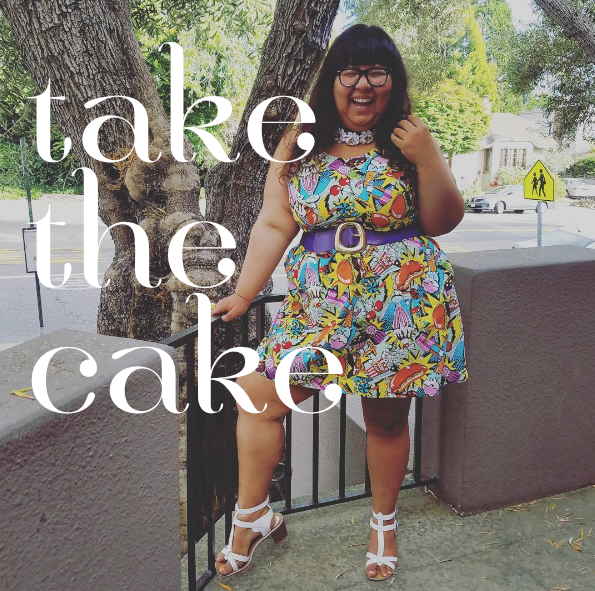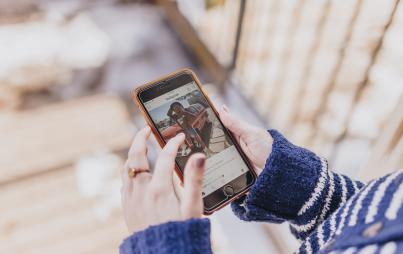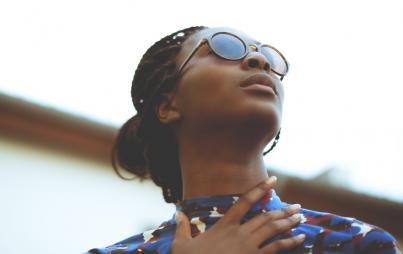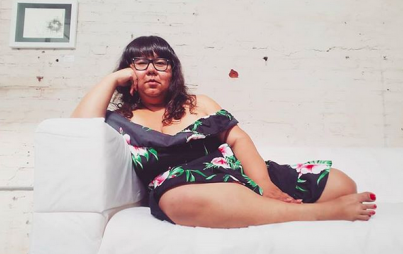
I felt super cute in a dress that exposed every inch of my big, wobbly arms, and that felt like a total triumph. But it reminded me of the limitations of cuteness as a measure of freedom. Image: Virgie Tovar/Instagram.
Didn’t I realize that women and queers and disabled people were being forced to live half-lives right now as I was eating tiny tartlets covered in fruit?
A historian told me once to always be suspicious of anyone who used the word “progress” to describe the unfolding of events from past to present and from present to future.
History is full of instances of change, she said, but it’s important to remember that change isn’t the same as progress.
I was thinking about her words on Sunday morning while I was sitting in my favorite café where they serve this drink called the Snowy Plover: a shot of espresso and a little brown sugar dropped into an icy glass of Pellegrino with a big spoonful of whipped cream on top.
I was there with Jacob, and I was telling him about an event I hosted called “Freedom from Fat Shame,” an alternative independence day celebration at the Berkeley Public Library.
Specifically, I was trying to explain to him why I’d felt so nervous about the audience.
This was the third event in the Fat Positive Summer Festival. I had asked five of my favorite writers to come and do a reading. I felt particularly stoked that the library had granted us a catering budget for the event, and this meant there was a buttload of my beloved bubbly water (PS coconut-infused LaCroix water is now my favorite thing — get on that).
The library was packed, standing room only.
Unlike the previous two events — which had largely been attended by people I didn’t know, friends, my mom, and other members of the public — this audience was comprised of a number of other notable activists who were core members of the fat political landscape of the '80s, '90s and early 2000s.
My work is built on the legacy of thought and action they championed when they were around my age.
They are still political and still fat liberationists, but are visible in a different way now. Though I will admit it’s difficult to discuss their work without imagining it as part of a bygone era, because it often feels like fat activism has become untethered from its lesbian, queer, and decidedly anti-assimilationist roots.
The tone of their activism differs in many ways from my own. At least that’s what it feels like when I read texts like Shadow on a Tightrope or the Fat Liberation Manifesto. At the event, I felt this glaring sense of self-awareness in their presence. The part of the fat movement I am in feels really different from the one they created.
To begin with, I legitimately feel like there are multiple movements happening under the banner of an often-interchangeable, somewhat vague thing called “body positivity.”
This “new movement” has replaced sobriety with snark. Discussions focused on stigma have morphed into declarations of resiliency. Manifestos addressed to society have been replaced by bulleted lists designed for individuals who want tools for dealing with fatphobia at the doctor or the workplace.
The texture, voice, and representation have all shifted markedly.
I wonder if these fat activists know their opinion matters to me. I wonder if they know that I worry that I’m part of something weird and major and that I don’t entirely understand. I wonder if they felt this way.
I was terrified that something that was said on stage would be taken as offensive. I was worried that my strange metaphors comparing patriarchy to being stuck in a horrible Chuck E. Cheese, for instance, would be considered too lighthearted considering the subject matter.
Didn’t I know that fat people were dying because of medical neglect?
Didn’t I realize that women and queers and disabled people were being forced to live half-lives right now as I was eating tiny tartlets covered in fruit?
Didn’t I understand that “positivity” isn’t a resource that benefits the most precariously positioned among us?
I looked at them and saw how my work was both part of their own and also a step away from it, in a direction I still can’t exactly call “progress.” I was able to put my work in perspective.
I could see myself standing on that stage, wearing a short sleeveless dress covered in pop art style hotdogs, hamburgers and Popsicles. I felt super cute in a dress that exposed every inch of my big, wobbly arms, and that felt like a total triumph. But it reminded me of the limitations of cuteness as a measure of freedom.
I thought about other things: the way that the writers were all able to get on and off the small stage, two feet off the ground, unassisted. All of them fit in the chairs we had provided, and each of their stories centered resiliency. My work centers resiliency — the decision of the individual to take on a social ill through thought and behavior often described as “empowering.”
I think about the fat activism that was happening in the era of the Fat Girl zine. Social media has largely replaced in-person gatherings. Blogs have largely replaced zines. And the focus has shifted away from centering super-sized people to what we currently call “in-betweenies” — people who regularly experience fatphobia but still have access to things like plus-size clothing and often unfettered air travel.
I think about the ways that a new language has emerged to sorta kinda half-articulate the murky ambivalence of “body positivity.”
Even though I often use phrases like “body positive,” “fat positive,” “body politics,” and “fat liberation” interchangeably, I know at the core that I am a shameless feminist who believes in a society where every person has access to a life free of bigotry or discrimination regardless of weight or health status.
I am a person who feels no desire to perform compliance by posting images of myself at the gym or eating vegetables on 'da Gramz. My work centers on my experiences as a 250-pound woman, but unlike some fats who are my size, I don’t believe that anyone’s right to exist unapologetically has an upper weight limit.
As the readers were leaving the stage and the audience was making its way out the door, I kinda ended up hiding behind the stacks. My friend Kendal comes over and tells me that I’ve failed at Operation Shy Times. She half-whispers: “Everyone knows you’re back here because they can hear your laugh all over the library.”
I wonder if these fat activists know their opinion matters to me. I wonder if they know that I worry that I’m part of something weird and major and that I don’t entirely understand.
I wonder if they felt this way.
I finish my Snowy Plover. As we are walking home, I remind myself that I don’t have to be perfect or “right” all the time or use a tone that feels inauthentic to me; I can wear weird dresses and talk about farting in fatphobia’s face because what matters most to me is what’s at the heart of my activism.
My greatest and most radical wishes are for love and healing and freedom — like real fuckin' freedom. And I know that that’s what these elder fat babes want too.







